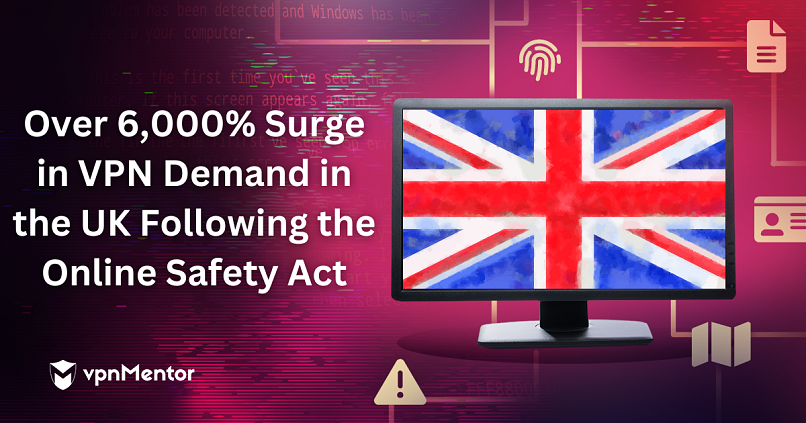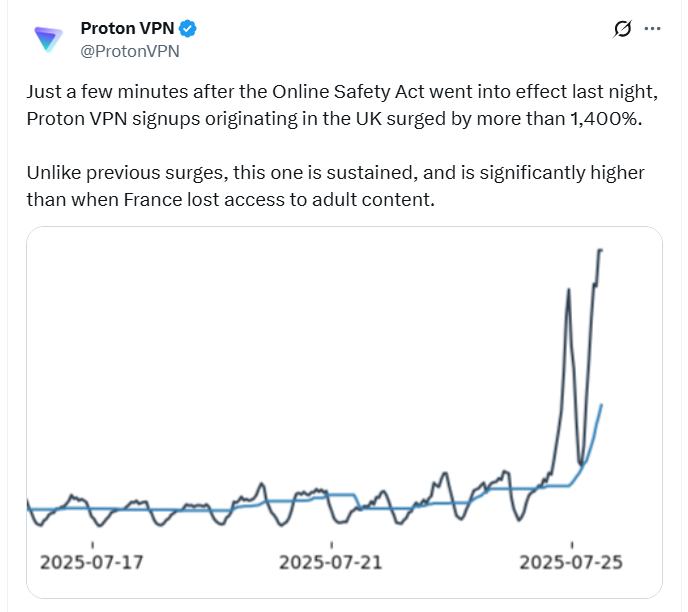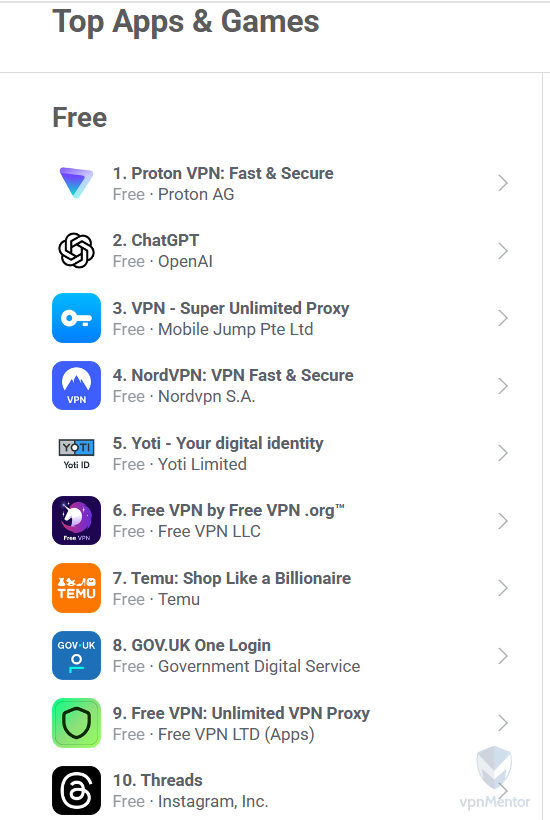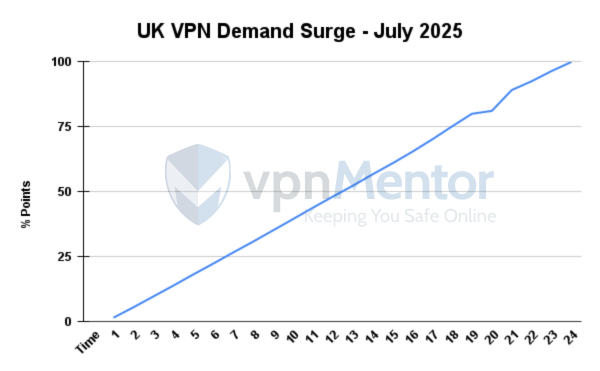Over 6,000% Surge in VPN Demand in the UK Following the Online Safety Act

Recently vpnMentor’s Research Team observed a significant spike in the demand for VPN services in the UK. The surge comes after Ofcom — the country’s regulator for online safety — implemented the Online Safety Act as a measure to keep children away from adult content.
What’s Important to Know:
- On July 25th, Ofcom — the UK’s regulator for online safety — implemented the Online Safety Act, which is essentially an age-verification law for adult content websites and apps.
- Per the new act, social media platforms and search engines must also prevent children from accessing pornography and potentially harmful material.
- Apps and platforms such as Reddit, Instagram, OnlyFans and even Xbox and PSN started using age verification methods, some using software like Yoti and Persona to comply with the new regulations.
- In case of Online Safety Act breaches, penalties can include formal warnings, up to £18m or 10% of global turnover (e.g., $16bn for Meta) in fines, and even UK-wide bans for extreme violations. Additionally, senior tech managers face up to two years in jail for repeated failures to protect children if they ignore Ofcom's enforcement notices.
As the regulations were implemented, ProtonVPN reported a major spike on signups by more than 1,400%. According to the VPN provider, “Unlike previous surges, this one is sustained, and is significantly higher than when France lost access to adult content.”
 This is a screenshot of ProtonVPN’s post on X
This is a screenshot of ProtonVPN’s post on X
While conducting our own research, vpnMentor's team also observed a remarkable surge in demand for VPN services in the UK. The demand saw a staggering and steady increase rate and reached its peak at 6,430% following the enactment of the law. It remained as such for almost two hours before it started dropping at the end of the day but with spikes of 900% up to 4000% the following days.
We also noticed that, since the implementation of the Online Safety Act, 5 VPN providers have reached the top 10 most downloaded apps from Apple’s App Store in the UK. Moreover, Yoti (OnlyFans and Instagram’s third-party age-verification software) is ranking at 5th place at the time of writing.
 This is a screenshot of the top 10 most downloaded free apps in the UK at the time of the act taking effect.
This is a screenshot of the top 10 most downloaded free apps in the UK at the time of the act taking effect.
Age-verification laws have been enacted around the world, and much like in this instance, VPN services have been used to circumvent them. While we at vpnMentor encourage children's online safety, this practice raises critical questions regarding the efficiency of these laws and the risks associated with both complying with and circumventing it.
There are many risks associated with providing your PII to a third-party age-verification software such as Persona or Yoti, which are the ones used by Reddit, Instagram, and OnlyFans to comply with this law.
Ofcom stated that: “There’s a number of methods a site or app might use to ask you to confirm your age. They might do this check themselves or use another company to do the check. These methods include:
- Facial age estimation – you show your face via photo or video, and technology analyses it to estimate your age.
- Open banking – you give permission for the age-check service to securely access information from your bank about whether you are over 18.
- Digital identity services – these include digital identity wallets, which can securely store and share information which proves your age in a digital format.
- Credit card age checks – you provide your credit card details and a payment processor checks if the card is valid.
- Email-based age estimation – you provide your email address, and technology analyses other online services where it has been used to estimate your age.
- Mobile network operator age checks – you give your permission for an age-check service to confirm whether or not your mobile phone number has age filters applied to it.
Photo-ID matching – this is similar to a check when you show a document.”
These age verification practices also present some general risks such as:
- Privacy concerns: Many of these methods involve sharing personal information or images, potentially liable to data privacy risks.
- Identity theft: Providing personal details for age verification could increase the risk of identity theft or fraud, especially if sensitive information is compromised.
- Manipulability: Age-verification methods may be vulnerable to manipulation. For example, facial recognition technology may be biased or inaccurately assess age.
- False positives: The verification methods may incorrectly conclude a user is underage, denying services to legitimate users.
Adding to this, throughout the years, we’ve been covering different incidents that highlight the dangers of using unreliable VPN services. For instance, VPN-related data breaches have exposed hundreds of millions of records of sensitive information, such as email addresses, passwords, payment details, and personal device data.
To mitigate the risks associated with using VPNs, consider the following criteria when choosing a provider:
- Strong encryption: Select a VPN service that has strong encryption protocols, such as AES-256 bit encryption, for your data transmission.
- No-logs policy: Choose a provider that has a strict no-logs policy in place to safeguard your connection logs and browsing history from being stored or shared.
- Kill switch feature: Find a VPN service that has a kill switch feature to automatically sever your device's internet connection if the VPN drops, hampering any data leaks.
- DNS leak protection: Make sure the VPN service you select includes built-in DNS leak protection to safeguard your DNS queries from third-party exposure, helping you maintain your privacy while online.
By prioritizing these essential features, users can enhance their online security and privacy when utilizing VPN services.
Past VPN Demand Growths
Our cybersecurity team has followed this kind of surge in VPN Services demand caused by geo-blocking of adult sites in different states of the USA as a consequence of age-verification laws enactment.
More recently our cybersecurity team observed a 874% VPN demand surge in France after Aylo’s Pornhub, geo-blocked French IP addresses.
vpnMentor neither encourages nor condones the misuse of VPNs for unlawful purposes. It is crucial for users to understand the legal implications of their online activities and to use VPN services responsibly.
Disclaimer: The content and images in this article are property of vpnMentor. We permit our images and content to be shared, as long as a credit with a link to the source is provided to vpnMentor as the original author. This way, we can continue our mission to provide expert content and maintain the integrity of our intellectual property.




Please, comment on how to improve this article. Your feedback matters!